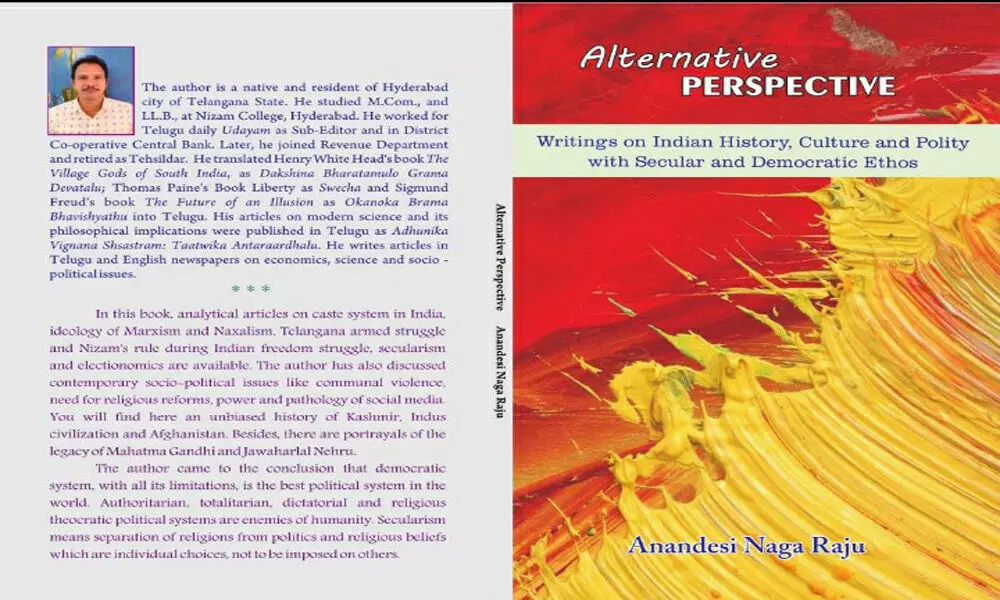A bouquet of Indian socio-cultural stories
Writings on Indian history, Culture and Polity with Secular and Democratic Ethos Anandesi Naga Raju Publisher: Anandesi Books, Nov 2021
image for illustrative purpose

The book is an anthology of 21 essays written by Anandesi Naga Raju over a period of time. The content spans a wide canvas of Indian history, contemporary political scenario and socio-cultural issues. Since each essay is a self-contained and independent piece, the reader has the liberty to pick and choose any of them randomly and read as per one's own priority without following any particular sequence. This, in itself, is a matter of supreme convenience. Yet another reader-friendly feature is the fact that Naga Raju employs a lucid and non-technical style for the easy understanding of lay readers as well as academic scholars, without resorting to elaborate foot notes, references and the like with which such books are so often overloaded.
In the article on Telangana Liberation (page 93), the author gives us a historical overview of this region since the days of the AsafJahi dynasty and how religious fanaticism goaded the then rulers to commit unspeakable atrocities on the citizens from time to time. We also learn about the Razakar movement perpetrated by the Nizam, the divide-and-rule strategies adopted by the British and the 'historical blunders' committed by the Communist Party at crucial moments during the freedom struggle. All these factors have ultimately boomeranged and imploded on themselves, thanks to the police action initiated by Sardar Patel in September 1948. The essay on Kashmir (page 77) is equally revealing. Starting from the prehistoric lineage of kings described in Rajatarangini of Kalhana, Naga Raju takes us on a journey into the past as if in a time capsule. It is interesting to know that Kashmir was the cradle of the Aryan civilization and that greatSanskrit luminaries like Panini and Charaka were natives of this land. Buddhism flourished here during emperor Ashoka's time, which was sustained in later periods by native kings. Islam came in during the 14th century and persecution of the native religions started soon after. Not all Muslim kings were religious bigots however, notable exceptions being king Zain-ul-Abidin and Emperor Akbar. Sikhism took roots during Maharaja Ranjit Singh's rule during the 19th century and his lineage continued till the time of partition in 1947. The author makes it clear that Kashmiriyat is not Islam, but a cultural continuum of "Nagas, Hinduism, Buddhism, (Islam), Sikhism, Sufism and from Afghans and Dogras".
Whether it is Telangana or Kashmir or Marxism or Gandhi, Naga Raju brings to bear exceptional objectivity, comprehensiveness and authenticity in describing the issues in question and offers a holistic solution. As the title of the book suggests, his is an alternative perspective – a perspective devoid of subjective bias or prejudice, a 360 degree view rather than a polarised standpoint. The diversity of sources he refers to (Rig veda, Rajatarangini, Das Capital, Constitution of India,…), and the authorities he quotes (Gandhi, Ambedkar, Marx, Somerset Maugham, Kaloji Rao,…) are simply mind boggling and show the depth and range of his scholarship.
All in all, the book is highly readable, educative and thought provoking, even if you tend to differ at places from the author's perception of things. Whether you are a serious reader or wont of casual bedtime reading, the book - and the issues it deals with – is sure to engage your attention.
(Review by Dr V Rama Rao)
[The author served in All India Radio, Doordarshan, FTII Pune and IGNOU. He also worked as CEO Mana TV, Director (media) in MANUU and as CTO of SV Bhakti Channel. Dr Rao was also a Technical Consultant to UNESCO, UN-ESCAP, ADB and COL on several international projects. He published over 40 papers in national/ international journals, several book chapters and a book on Digital Broadcasting. He is a life fellow IETE, life fellow BES and life member ISCA.]

